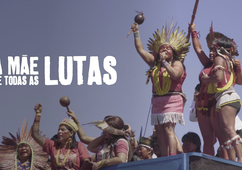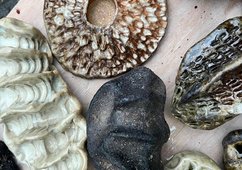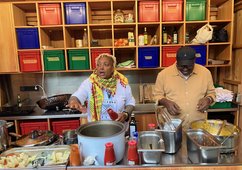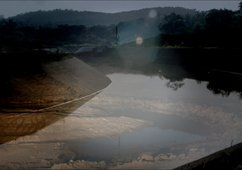all ages welcome
In Portuguese, with translation to English and whispered translation to German
public

For 16 year-olds and older
In Portuguese, with translation to English and whispered translation to German

This incessant violence against the landscape has a very destructive dynamic. It doesn’t just happen here in Brazil. Engineering is failing across the planet. It focuses on natural resources, on water, on the landscape, on the mountains - it flattens everything.
– Ailton Krenak

all ages welcome
In Portuguese, with translation to English and whispered translation to German
public

for youths and adults (10 year-olds and older)
In Portuguese, with translation to English and whispered translation to German
open for registration

all ages welcome
In Portuguese, with translation to English and whispered translation to German
public

all ages welcome
In Portuguese, with translation to English and whispered translation to German
public

for adults
In Portuguese, with translation to English and whispered translation to German
public
In times of multiple crises, political upheavals, and intensifying social debates, it is easy to lose hope for a livable future. This program invites the general public to reflect, learn, and connect with strategies and movements from the Global South to explore what we can create from the ground we inhabit. How can we repair what seems irreparable, the devastating loss brought by extractivism and ecological collapse? How might we imagine forms of justice that attend not only to human suffering, but also to the wounded landscapes and more-than-human worlds?
This series of gatherings invites us to reflect, listen, and learn together with activists, scholars, and artists from Brazil who are confronting the enduring violence of mining and extractive industries. Through their struggles in Minas Gerais (focusing on Brumadinho and Mariana) and Maranhão, we will talk about socio-territorial conflicts on land, soil and biodiversity and reflect on the necessity of reparation, the limits of this dominant resource-consuming economic system, but also on investigating practices of resistance and regeneration that seek to forge worlds and social ecological and economic transformation otherwise.
Marking ten years since the Mariana dam collapse (2015) and revisiting the Brumadinho disaster (2019), both in Minas Gerais, Brazil, this event reflects on the lasting consequences of mining and extractivist catastrophes in the so-called Global South. Caused by multinational corporations such as Vale, BHP Billiton, and TÜV SÜD, these socio-ecological crimes killed hundreds of people, poisoned entire river systems, and devastated ecosystems and communities, including those of the Krenak people. Despite abundant evidence, accountability remains elusive.
These tragedies reveal a broader pattern of destructive, profit-driven practices reproduced across Brazil and beyond. In Maranhão, in the country’s northeast, the rapid expansion of industrial soy cultivation has led to deforestation, pesticide contamination, and land grabbing, transforming the once-vibrant Cerrado biome. Massive farms displace rural and Afro-Brazilian communities, pollute rivers and groundwater, and intensify social conflicts. Today, 82% of all pesticide poisoning cases in Brazil occur in this region, and at least 19 community leaders have been killed in recent years.
For the event we invite two delegations from Brazil representing communities from the states of Minas Gerais and Maranhão to join to discuss with Berlin-based researchers and artists, as well as the Brazilian diaspora. They will relate on their experiences but also articulate their concerns in the political and legal sphere, reporting on the current proceedings and the relatives' search for justice, on the threat of mining resuming, supply chains, on the current flexibilization of environmental laws in Brazil as well on the responsibility of the Global North. A few days before the climate conference COP30 held in Belém (Pará, Brazil) we will discuss with them the question on reparation for socio-ecological devastation, as well as to imagine paths towards reparative and transformative the collective pursuit of justice as well as possibilities for collective socio-ecological and economic transformation.
The event will be held in Portuguese, with translation to English, with the possibility of whispered translation to German. The series fosters active engagement, shared learning, and the cultivation of new perspectives that inspire collective action.
Organized by maiz brasil – treemedia e.V. | Spore Initiative
In cooperation with: Misereor, FDCL, ECCHR, KoBra, Instituto Cordilheira, AVABRUM, pepp e.V., Centro de Direitos Humanos da Diocese de Balsas and the Federal University of Maranhão, Lateinamerikaforum
Curated by Juliana Streva and Viviane Tabach
Conceptual Creator and Project Management: Constanze Lemmerich
Curatorial Producer and Cultural Networker: Franziska Gerth
Design by Lucio Telles, based on the artwork of Júlia Pontés
Friday, October 31st
7:30 – 9:30 pm — Grammars of the soil, film screening and roundtable
Saturday, November 1st
10:00 am –12:30 pm — Gestures for the soil, Clay-Workshop
12:30 pm – 14:00 pm — Feijoada by Quilomboallee, shared lunch
2:00 – 3:30 pm — Beyond Property: Imagining with the Earth, Screening of Short films
4:00 – 5:30 pm — Seeding New Landscapes, Roundtable
Image Credit: Julia Pontes
Funded by: FEB, LEZ, Stiftung Umverteilen, Katholischer Fonds and Brot für die Welt.